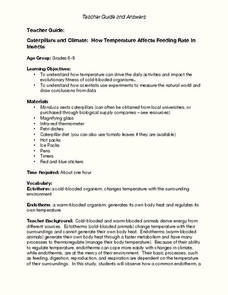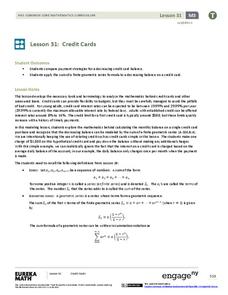iCivics
For The President, All In A Day's Work
How does the president of the United States get the authority to exercise his/her duties? What responsibilities and tasks go into a hard day's work for the president? Here is a lesson plan that includes several instructional materials...
National Park Service
Living & Non-Living Interactions
What better way to learn about ecosystems than by getting outside and observing them first hand? Accompanying a field trip to a local park or outdoor space, this series of collaborative activities engages children in learning about the...
Utah Education Network (UEN)
Microwave Magic
The microwave is a staple in many American households, but how exactly does it work? Approach this question from a scientific and practical standpoint, and discover cooking strategies, recipes, and methodologies for the standard microwave.
Endowment of United States Institute of Peace
Active Listening
Ensure that your pupils listen to one another in constructive ways by introducing them to active listening skills through discussion, role playing, and partner work.
Federal Reserve Bank
To Rent-to-Own or Not to Rent-to-Own?
Explore the key elements of a contract with your young adults, and delve into the features and unique benefits of a rent-to-own contract through discussion and worksheet practice.
Curated OER
Shizuko’s Daughter: Problematic Situation
How could you decide which of your late mother's possessions are important enough to take to college with you? Decide which items would be the most valuable to you with an activity based on Kyoko Mori's Shizuko's Daughter. After learners...
Dick Blick
ArtStraw Architecture
While architects and engineers don't often build with plastic straws and foam board, the same principles still apply. Challenging both the creativity and critical thinking of students, this engaging design project is perfect for art and...
Delegation of the European Union to the United States
Structure of Government within the EU
The political system of the European Union is historically unique and has been constantly evolving. To better understand the structure of the EU, class members compare the EU's branches to those of the United States Federal Government.
Curated OER
Caterpillars and Climate: How Temperature Affects Feeding Rate In Insects
Do you eat more when you are hot or when you are cold? Young scientists observe the eating pace of two caterpillars at different temperatures. The differences in endotherm and ecotherm animals' ability to adjust to temperature change...
US Department of Labor
Teamwork
Here's a series of five exercises designed to help teens develop the team work skills needed in the 21st century classroom and workplace.
EngageNY
Credit Cards
Teach adolescents to use credit responsibly. The 32nd installment of a 35-part module covers how to calculate credit card payments using a geometric series. It teaches terminology and concepts necessary to understand credit card debt.
Center for History and New Media
Growing Up in a Segregated Society, 1880s–1930s
What did segregation look like in the beginning of the 20th century? Middle and high schoolers view images of segregated areas, read passages by Booker T. Washington and W.E.B. DuBois, and come to conclusions about how the influence of...
Messenger Education
Give Me a Boost—How Gravity Assists Aid Space Exploration
The propellant needed for space explorations runs in the thousands, while paying to get the craft into orbit costs millions! In the second installment of three, two activities explore laws of conservation of energy and momentum. Using...
Code.org
Image Scroller with Key Events
Discover how to embed images in lists. Scholars modify an existing app to include an image scroller in the 17th lesson of the series. They learn to refactor code and remove redundancies after modifying code.
Chicago Botanic Garden
Accessing Prior Knowledge: Global Climate Change Survey
Begin a unit on weather and climate change by assessing prior knowledge of the topic. Learners respond to a survey with questions that ask what they think causes climate change, the effects of climate change, and if it is important to...
Chicago Botanic Garden
Greenhouse Gas Emissions — Natural and Human Causes
What impact do humans have on greenhouse gas emissions? What are the natural causes of these gasses? Thanks to the carbon cycle, carbon dioxide eats away at the earth's atmosphere with the intensified help of humans. Young scientists...
Chicago Botanic Garden
Are You Bigfoot?
Scholars independently explore several websites to calculate their ecological footprint. Using their new found knowledge, they answer six short-answer questions and take part in a grand conversation with their peers about how our...
Chicago Botanic Garden
Faces of Climate Change
Sometimes, the best solution to a problem can be found by walking in someone else's shoes. Here, scholars use character cards to take on the roles of people around the world. They determine how their character's life affects our...
Science Matters
Slip Sliding Along
The San Andreas Fault is the largest earthquake-producing fault in California. In the seventh lesson in the 20 part series, pupils create maps of California, focusing on the San Andreas Fault system. The comparison of where California is...
Chicago Botanic Garden
Greenhouse Gas Emissions – Natural and Human Causes
Part three in the series of seven has pupils discussing the different greenhouses gases, learning about the carbon cycle, and then watching a short video about the carbon cycle. Based on their knowledge, individuals complete a greenhouse...
Chicago Botanic Garden
Introducing Ecosystem Services
Purifying air and water, providing soil in which to grow crops, and moving water through its natural cycle are all services an ecosystem provides that benefit humans. Lesson four in a series lets learners explore and discuss the value of...
Chicago Botanic Garden
Personal Choices and the Planet
The last activity in the series of four has individuals determine steps they can take to reduce their carbon footprints and then analyze their schools' recycling programs. Through a sustainability audit, they identify how and where their...
Chicago Botanic Garden
Calculating Your Carbon Footprint
Unplugging from technology for one day per week will decrease your carbon footprint—are you up to the challenge? Part two in a series of three allows individuals to explore their personal carbon footprints. By first taking a quiz at home...
Chicago Botanic Garden
Faces of Climate Change
You know global warming is real when your squirrel feeder is full of popped corn instead of kernels! Activity two in a series of five allows learners to explore climate change through the eyes of another. After briefly analyzing their...
Other popular searches
- Time Management Skills
- Time Management Games
- Time Management Activity
- Teaching Time Management
- Time Management Lessons
- Management Time Study Skills
- Time Management Lesson Plans
- Time Management Case Study
- Time Management Daily Agenda
- Time Management in Science
- Time Management Dialy Agenda
- Time Management System

























